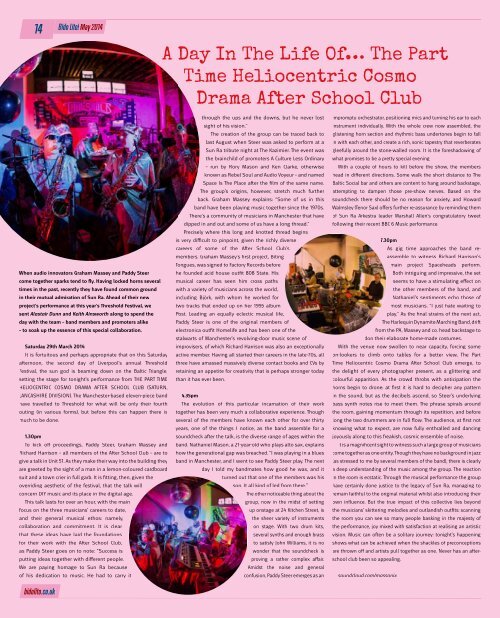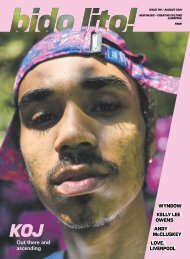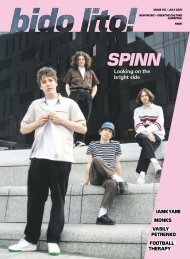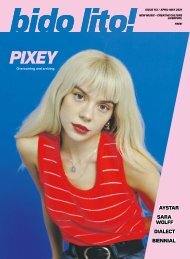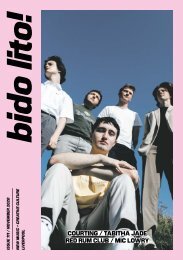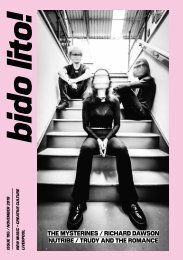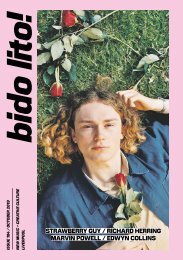Issue 44 / May 2014
May 2014 issue of Bido Lito! Featuring WE CAME OUT LIKE TIGERS, LIVERPOOL SOUND CITY 2014, HOOTON TENNIS CLUB, GLOSSOM, THE PART TIME HELIOCENTRIC COSMO DRAMA AFTER SCHOOL CLUB, THE VIPER LABEL and much more.
May 2014 issue of Bido Lito! Featuring WE CAME OUT LIKE TIGERS, LIVERPOOL SOUND CITY 2014, HOOTON TENNIS CLUB, GLOSSOM, THE PART TIME HELIOCENTRIC COSMO DRAMA AFTER SCHOOL CLUB, THE VIPER LABEL and much more.
Create successful ePaper yourself
Turn your PDF publications into a flip-book with our unique Google optimized e-Paper software.
14<br />
Bido Lito! <strong>May</strong> <strong>2014</strong><br />
A Day In The Life Of… The Part<br />
Time Heliocentric Cosmo<br />
Drama After School Club<br />
When audio innovators Graham Massey and Paddy Steer<br />
come together sparks tend to fly. Having locked horns several<br />
times in the past, recently they have found common ground<br />
in their mutual admiration of Sun Ra. Ahead of their new<br />
project’s performance at this year’s Threshold Festival, we<br />
sent Alastair Dunn and Keith Ainsworth along to spend the<br />
day with the team – band members and promoters alike<br />
– to soak up the essence of this special collaboration.<br />
Saturday 29th March <strong>2014</strong><br />
It is fortuitous and perhaps appropriate that on this Saturday<br />
afternoon, the second day of Liverpool's annual Threshold<br />
Festival, the sun god is beaming down on the Baltic Triangle,<br />
setting the stage for tonight's performance from THE PART TIME<br />
HELIOCENTRIC COSMO DRAMA AFTER SCHOOL CLUB (SATURN,<br />
LANCASHIRE DIVISION). The Manchester-based eleven-piece band<br />
have travelled to Threshold for what will be only their fourth<br />
outing (in various forms), but before this can happen there is<br />
much to be done.<br />
1.30pm<br />
To kick off proceedings, Paddy Steer, Graham Massey and<br />
Richard Harrison – all members of the After School Club – are to<br />
give a talk in Unit 51. As they make their way into the building they<br />
are greeted by the sight of a man in a lemon-coloured cardboard<br />
suit and a town crier in full garb. It is fitting, then, given the<br />
overriding aesthetic of the festival, that the talk will<br />
concern DIY music and its place in the digital age.<br />
This talk lasts for over an hour, with the main<br />
focus on the three musicians' careers to date,<br />
and their general musical ethos: namely,<br />
collaboration and commitment. It is clear<br />
that these ideas have laid the foundations<br />
for their work with the After School Club,<br />
as Paddy Steer goes on to note: “Success is<br />
putting ideas together with different people.<br />
We are paying homage to Sun Ra because<br />
of his dedication to music. He had to carry it<br />
bidolito.co.uk<br />
through the ups and the downs, but he never lost<br />
sight of his vision.”<br />
The creation of the group can be traced back to<br />
last August when Steer was asked to perform at a<br />
Sun Ra tribute night at The Kazimier. The event was<br />
the brainchild of promoters A Culture Less Ordinary<br />
– run by Rory Mason and Ken Clarke, otherwise<br />
known as Rebel Soul and Audio Voyeur – and named<br />
Space Is The Place after the film of the same name.<br />
The group's origins, however, stretch much further<br />
back. Graham Massey explains: “Some of us in this<br />
band have been playing music together since the 1970s.<br />
There's a community of musicians in Manchester that have<br />
dipped in and out and some of us have a long thread.”<br />
Precisely where this long and knotted thread begins<br />
is very difficult to pinpoint, given the richly diverse<br />
careers of some of the After School Club’s<br />
members. Graham Massey’s first project, Biting<br />
Tongues, was signed to Factory Records before<br />
he founded acid house outfit 808 State. His<br />
musical career has seen him cross paths<br />
with a variety of musicians across the world,<br />
including Björk, with whom he worked for<br />
two tracks that ended up on her 1995 album<br />
Post. Leading an equally eclectic musical life,<br />
Paddy Steer is one of the original members of<br />
electronica outfit Homelife and has been one of the<br />
stalwarts of Manchester’s revolving-door music scene of<br />
improvisers, of which Richard Harrison was also an exceptionally<br />
active member. Having all started their careers in the late-70s, all<br />
three have amassed massively diverse contact books and CVs by<br />
retaining an appetite for creativity that is perhaps stronger today<br />
than it has ever been.<br />
4.35pm<br />
The evolution of this particular incarnation of their work<br />
together has been very much a collaborative experience. Though<br />
several of the members have known each other for over thirty<br />
years, one of the things I notice, as the band assemble for a<br />
soundcheck after the talk, is the diverse range of ages within the<br />
band. Nathaniel Mason, a 21-year-old who plays alto sax, explains<br />
how the generational gap was breached. “I was playing in a blues<br />
band in Manchester, and I went to see Paddy Steer play. The next<br />
day I told my bandmates how good he was, and it<br />
turned out that one of the members was his<br />
son. It all kind of led from there.”<br />
The other noticeable thing about the<br />
group, now in the midst of setting<br />
up onstage at 24 Kitchen Street, is<br />
the sheer variety of instruments<br />
on stage. With two drum kits,<br />
several synths and enough brass<br />
to satisfy John Williams, it is no<br />
wonder that the soundcheck is<br />
proving a rather complex affair.<br />
Amidst the noise and general<br />
confusion, Paddy Steer emerges as an<br />
impromptu orchestrator, positioning mics and turning his ear to each<br />
instrument individually. With the whole crew now assembled, the<br />
glistening horn section and rhythmic bass undertones begin to fall<br />
in with each other, and create a rich, sonic tapestry that reverberates<br />
gleefully around the stone-walled room. It is the foreshadowing of<br />
what promises to be a pretty special evening.<br />
With a couple of hours to kill before the show, the members<br />
head in different directions. Some walk the short distance to The<br />
Baltic Social bar and others are content to hang around backstage,<br />
attempting to dampen those pre-show nerves. Based on the<br />
soundcheck there should be no reason for anxiety, and Howard<br />
Walmsley (Tenor Sax) offers further re-assurance by reminding them<br />
of Sun Ra Arkestra leader Marshall Allen's congratulatory tweet<br />
following their recent BBC 6 Music performance.<br />
7.30pm<br />
As gig time approaches the band reassemble<br />
to witness Richard Harrison's<br />
main project Spaceheads perform.<br />
Both intriguing and impressive, the set<br />
seems to have a stimulating effect on<br />
the other members of the band, and<br />
Nathaniel's sentiments echo those of<br />
most musicians. “I just hate waiting to<br />
play.” As the final strains of the next act,<br />
The Harlequin Dynamite Marching Band, drift<br />
from the PA, Massey and co. head backstage to<br />
don their elaborate home-made costumes.<br />
With the venue now swollen to near capacity, forcing some<br />
on-lookers to climb onto tables for a better view, The Part<br />
Time Heliocentric Cosmo Drama After School Club emerge, to<br />
the delight of every photographer present, as a glittering and<br />
colourful apparition. As the crowd throbs with anticipation the<br />
horns begin to drone: at first it is hard to decipher any pattern<br />
in the sound, but as the decibels ascend, so Steer's underlying<br />
bass synth notes rise to meet them. The phrase spirals around<br />
the room, gaining momentum through its repetition, and before<br />
long the two drummers are in full flow. The audience, at first not<br />
knowing what to expect, are now fully enthralled and dancing<br />
joyously along to this freakish, cosmic ensemble of noise.<br />
It is a magnificent sight to witness such a large group of musicians<br />
come together as one entity. Though they have no background in jazz<br />
(as stressed to me by several members of the band), there is clearly<br />
a deep understanding of the music among the group. The reaction<br />
in the room is ecstatic. Through the musical performance the group<br />
have certainly done justice to the legacy of Sun Ra, managing to<br />
remain faithful to the original material whilst also introducing their<br />
own influence. But the true impact of this collective lies beyond<br />
the musicians’ skittering melodies and outlandish outfits: scanning<br />
the room you can see so many people basking in the majesty of<br />
the performance, joy mixed with satisfaction at realising an artistic<br />
vision. Music can often be a solitary journey: tonight’s happening<br />
shows what can be achieved when the shackles of preconceptions<br />
are thrown off and artists pull together as one. Never has an afterschool<br />
club been so appealing.<br />
soundcloud.com/massonix


